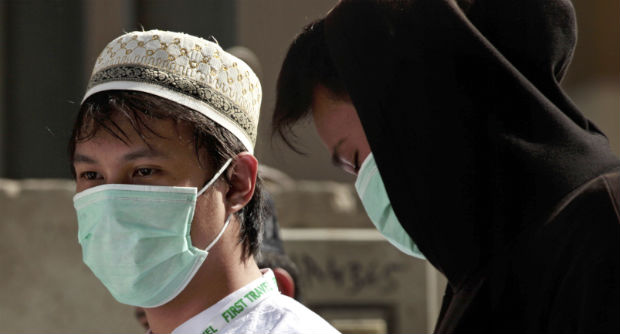Saudi MERS infections soar ahead of hajj pilgrimage

In this Tuesday May, 13, 2014 file photo, Muslim pilgrims wear surgical masks to help prevent infection from a respiratory virus known as the Middle East Respiratory Syndrome (MERS) in the holy city of Mecca, Saudi Arabia. Saudi, which is grappling to contain the spread of a frequently deadly respiratory virus, announced Tuesday, June 3, 2014 that a review of the illness led authorities to sharply revise upward the number of confirmed infections and deaths from the disease. A report by the official Saudi Press Agency said authorities have registered a total of 688 confirmed infections and 282 deaths as a result of MERS since the virus was first identified in 2012. AP
RIYADH, Saudi Arabia—MERS coronavirus infections have soared in Saudi Arabia ahead of the hajj pilgrimage, killing three people and forcing a Riyadh hospital to close its emergency ward, officials and newspapers said Thursday.
The Saudi Gazette said authorities shut the emergency ward at one of the capital’s largest hospitals, King Abdulaziz Medical City (KAMC-R), “after at least 46 people, including hospital staff” contracted the Middle East Respiratory Syndrome.
The health ministry has said it registered 21 confirmed MERS infections, all but one of them in Riyadh, between August 9 and 15.
There was no immediate explanation for the difference in the figures, but the ward closure at KAMC-R was confirmed to AFP by a hospital employee.
The executive director of its Infection Prevention and Control Department, Hanan Balkhi, confirmed in a statement on the facility’s website that there were MERS cases among health workers.
Article continues after this advertisement“In view of … the increasing number of cases of MERS-coronavirus, and due to the around-the-clock large numbers of patients in the ER at KAMC-R and the difficulty of applying quarantine measures, preventive measures have been upgraded,” he said.
Article continues after this advertisementThese include reducing the number of patients and allocating “three wings to accommodate the quarantine of suspected/confirmed cases.”
Cases ‘still limited’
Health Minister Khalid al-Falih said late Wednesday that the hospital “has faced a spread of the coronavirus during the past few weeks, which started as one case.”
However, in remarks carried by the official SPA news agency, he gave reassurances that the cases were “still limited.”
He urged “vigilance when contacting people with respiratory illnesses” and preventive measures when visiting MERS patients.
The latest deaths occurred in Riyadh, and the three victims were all Saudis aged between 65 and 86, the health ministry said.
This raises to 483 the number of deaths out of 1,118 MERS infections in Saudi Arabia, where the virus first appeared in 2012, according to the ministry.
Saudi Arabia, preparing to host more than two million Muslims from all over the world for the annual hajj to Mecca and Medina, Islam’s holiest sites, expected to start on September 21, is the country worst hit by the coronavirus.
Falih said authorities have “prepared a comprehensive preventive plan starting from entry points, to hajj sites, until the pilgrims return home.”
The ministry will “dedicate all its efforts to prevent any infectious disease from spreading in the kingdom,” SPA quoted him as saying.
Officials declared last year’s hajj epidemic-free after the oil-rich kingdom contracted thousands of health workers to ensure pilgrims were protected from MERS and Ebola, another deadly viruses.
MERS is considered a deadlier but less infectious cousin of the Severe Acute Respiratory Syndrome (SARS) virus that appeared in Asia in 2003 and killed hundreds of people, mostly in China.
Its symptoms can include fever, coughing and shortness of breath. There are no approved vaccines against MERS, which is believed to originate in camels.